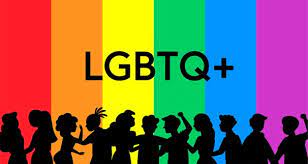“It is quite weird to consider something ‘normal’ in a world full of diversities.” This marginalised group has been the most discriminated against, over centuries. They are denied the most human and basic rights in many countries and are even penalised with death just for existing. The sole basis of this cruel discrimination is their sexual orientation, gender expression or identity, etc.

In India, being a part of the rainbow was celebrated in MANY tribes for example the Ho tribe of Jharkhand. Besides the tribes, if you happen to visit ancient temples with wall carvings or stone statues you might just be surprised to find many instances of homosexual or “two-spirit” expressions. To enhance your knowledge, you can always read “Tritiya Prakriti- People of Third Sex” a book by Amara Das Wilhelm which compiles years of extensive research of Sanskrit texts from medieval and ancient India, and proves that homosexuals and the “third gender” were not only in existence in the Indian society back then but that these identities were also widely accepted.
There’s a growing need to empathise with and accept LGBTQIA+ folks by being an ally, following are some commonly asked questions!
What does LGBTQIA+ stand for?
The rainbow spectrum is a lot bigger than one can imagine and thus to be inclusive of each unique identity the “+” is used. In this commonly used abbreviation, the letters stand for –
L– lesbian
G– gay
B– bisexual
T– transgender/transsexual
Q– queer/questioning
I– intersex
A– asexual/androgynous
What generally makes people aware of their sexual orientation?
Realisation of one’s identity depends on their surroundings, awareness, and representation in media.
People may experience different emotions and may either want to work on their expression or not. Watching other people going through similar circumstances aids their worries.
What does it take for a person to come out?
It takes a lot of courage and hopeful support for people to finally be themselves. The fear of rejection or even worse might drive them back to square one of self-acceptance and self-love.
What makes the heteronormative society bearable?
Loving friends and family members foremost. Representation in media helps ease the feeling of alienation and loneliness. Not getting treated any differently gives a subtle sense of equality and happiness.
Does sexual orientation affect one’s working environment?
Over the past centuries, there have been countless cases pertaining to people losing their jobs or being discriminated based on their orientation or expression, the world is getting a little better, one baby step at a time!
Can being a part of the rainbow affect one’s mental health?
Present day, the amount of universal rejection exceeds the aggregate of universal acceptance. On an individual scale it depends on people encircling the individual. So yes, it can cause mental health issues if the given person’s environment is not supportive/safe!
What can I do to help or support my LGBTQIA+ family members or friends? How do I make someone feel safe enough to come out?
Here are some pointers on how to be a good ally-
- Educate yourself on the required terms/topics.
- Confront homophobic or transphobic people or jokes.
- Listen, learn and don’t make being a part of LGBTQIA+ a taboo topic! Speak about it openly.
- Correct yourself if you misgender someone or use their dead name!
- Treat the LGBTQIA+ like you treat the cishet.
- Be open-minded to new identities that you never might’ve heard before because as society progresses so do people and their ideals!
- Foster a gender-neutral environment around you.
I hope we all stay on the same page and respect everyone’s boundaries and strive to progress for the better.
By
Srushti Sonkusare
